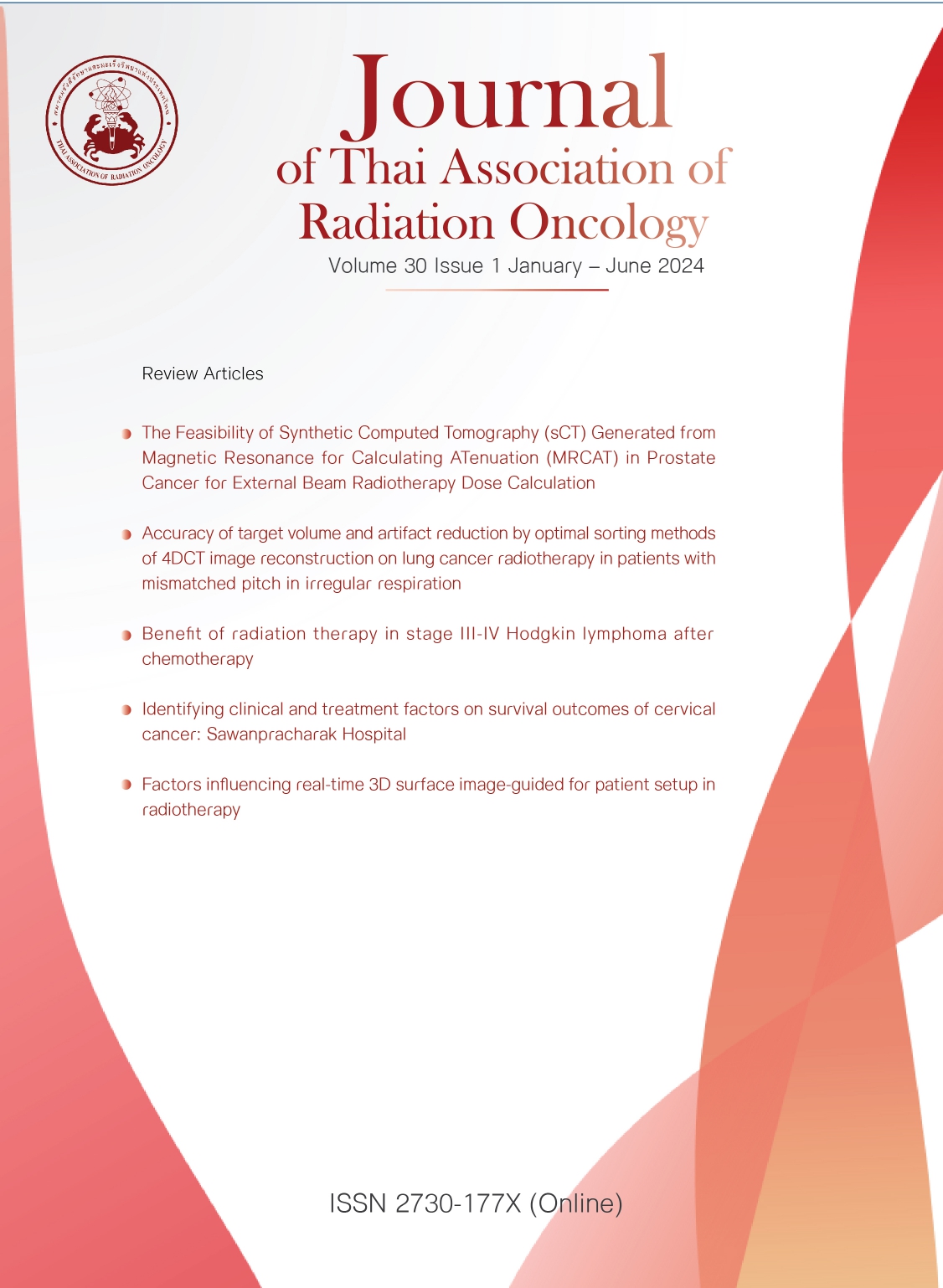Benefit of radiation therapy in stage III-IV Hodgkin lymphoma after chemotherapy
Keywords:
Bulky disease, Consolidation radiation therapy, Hodgkin lymphoma, Modern chemotherapyAbstract
Background: The benefit of radiation therapy as a consolidation therapy after chemotherapy in advanced-stage Hodgkin lymphoma remains controversial, especially after the widespread use of positron emission tomography (PET)/computed tomography (CT) or Ga-67 scintigraphy.
Objective: We conducted a retrospective review in our institute to evaluate the benefit of consolidative radiotherapy in patients who received a modern chemotherapy regimen.
Materials and methods: Between January 2010 and December 2019, 33 patients with newly diagnosed stage III or IV Hodgkin lymphoma were identified from the Chulabhorn Hospital database. After excluding 15 patients who did not meet our inclusion criteria (1 HIV infection, 5 early-stage after reviewed, 5 did not used PET-CT or Ga-67 scintigraphy and 4 with incomplete medical history), the remaining 18 patients were enrolled.
Results: After a median follow-up of 48 months, the 3-year disease-free survival rate was 66.7% in patients who received radiation therapy, versus 55.6% in patients who did not receive radiation therapy (p = 0.391). The 3-year overall survival rate was 100% in both groups. In total, 11 patients (61%) had complete metabolic response (CMR) after first-line chemotherapy, whereas three (16.7%), one (5.6%), and three (16.7%) had a partial response, stable disease, and disease progression, respectively. Seven patients (38.9%) experienced relapse after treatment, and 71.4% of relapses occurred at the original disease site. Of 7 patients who had residual after first-line chemotherapy, three received further radiotherapy whereas four did not. Relapse occurred in all four patients who did not received radiotherapy after residual disease. No patients who achieved CMR in both the interim and post-treatment evaluations experienced relapse. Four of nine patients with bulky masses more than 7 cm in size had CMR after first-line chemotherapy. Interestingly, in this group, no relapse occurred in patients who did not receive radiation therapy, whereas one of three patients (33.3%) who received radiation therapy exhibited relapse. No grade 3–4 acute radiation toxicities occurred in this study, but two of nine patients (22.2%) had grade 3 late pneumonitis that required hospitalization. No secondary malignancy was observed.
Conclusion: Using functional imaging as an evaluation method, consolidation radiation therapy may not be necessary in advanced Hodgkin lymphoma.
References
Sung H, Ferlay J, Siegel RL, Laversanne M, Soerjomataram I, Jemal A, et al. Global cancer statistics 2020: GLOBOCAN estimates of incidence and mortality worldwide for 36 cancers in 185 countries. CA Cancer J Clin. 2021; 71:209-49.
Tepper JE, Foote RL, Michalski JM. Gunderson & Tepper’s Clinical Radiation Oncology (5th edition). Philadelphia, PA: Elsevier; 2021.
Borchmann P, Haverkamp H, Diehl V, Cerny T, Markova J, Ho AD, et al. Eight cycles of escalated-dose BEACOPP compared with four cycles of escalated-dose BEACOPP followed by four cycles of baseline-dose BEACOPP with or without radiation therapy in patients with advanced-stage Hodgkin’s lymphoma: final analysis of the HD12 trial of the German Hodgkin Study Group. J Clin Oncol. 2011; 29:4234-42.
Aleman BM, Raemaekers JM, Tirelli U, Bortolus R, van’t Veer MB, Lybeert ML, et al. Involved-field radiation therapy for advanced Hodgkin’s lymphoma. N Engl J Med 2003; 348:2396-2406.
Johnson PW, Radford JA, Cullen MH, Sydes MR, Walewski J, Jack AS, et al. Comparison of ABVD and alternating or hybrid multidrug regimens for the treatment of advanced Hodgkin’s lymphoma: results of the United Kingdom Lymphoma Group LY09 Trial (ISRCTN97144519). J Clin Oncol. 2005; 23:9208-18.
Johnson PW, Sydes MR, Hancock BW, Cullen M, Radford JA, Stenning SP, et al. Consolidation radiation therapy in patients with advanced Hodgkin’s lymphoma: survival data from the UKLG LY09 randomized controlled trial (ISRCTN97144519). J Clin Oncol. 2010; 28:3352-9.
Loeffler M, Brosteanu O, Hasenclever D, Sextro M, Assouline D, Bartolucci AA, et al. Meta-analysis of chemotherapy versus combined modality treatment trials in Hodgkin’s disease. International Database on Hodgkin’s Disease Overview Study Group. J Clin Oncol. 1998; 16:818-29.
Engert A, Haverkamp H, Kobe C, Markova J, Renner C, Ho A, et al. Reduced-intensity chemotherapy and PET-guided radiation therapy in patients with advanced stage Hodgkin’s lymphoma (HD15 trial): a randomised, open-label, phase 3 non-inferiority trial [published correction appears in Lancet. 2012 May 12;379(9828):1790]. The Lancet. 2012; 379:1791-9.
Kriz J, Reinartz G, Dietlein M, Kobe C, Kuhnert G, Haverkamp H, et al. Relapse analysis of irradiated patients within the HD15 trial of the German Hodgkin Study Group. Int J Radiat Oncol Biol Phys. 2015; 92:46-53.
Kobe C, Dietlein M, Franklin J, Markova J, Lohri A, Amthauer H, et al. Positron emission tomography has a high negative predictive value for progression or early relapse for patients with residual disease after first-line chemotherapy in advanced-stage Hodgkin lymphoma. Blood. 2008; 112:3989-94.
Lister TA, Crowther D, Sutcliffe SB, Glatstein E, Canellos GP, Young RC, et al. Report of a committee convened to discuss the evaluation and staging of patients with Hodgkin’s disease: Cotswolds meeting. J Clin Oncol. 1989; 7:1630.
Cheson BD, Fisher RI, Barrington SF, Cavalli F, Schwartz LH, Zucca E, et al. Recommendations for initial evaluation, staging, and response assessment of Hodgkin and non-Hodgkin lymphoma: the Lugano classification. J Clin Oncol. 2014; 32:3059.
Younes A, Hilden P, Coiffier B, Hagenbeek A, Salles G, Wilson W, et al. International Working Group consensus response evaluation criteria in lymphoma (RECIL 2017). Ann Oncol. 2017; 28:1436-47.
Engert A, Schiller P, Josting A, Herrmann R, Koch P, Sieber M, et al. Involved-field radiation therapy is equally effective and less toxic compared with extended-field radiation therapy after four cycles of chemotherapy in patients with early-stage unfavorable Hodgkin’s lymphoma: results of the HD8 trial of the German Hodgkin’s Lymphoma Study Group. J Clin Oncol. 2003; 21:3601-8.
Sasse S, Klimm B, Görgen H, Fuchs M, Heyden-Honerkamp A, Lohri A, et al. Comparing long-term toxicity and efficacy of combined modality treatment including extended- or involved-field radiation therapy in early-stage Hodgkin’s lymphoma. Ann Oncol. 2012; 23:2953-9.
Radford JA, Cowan R, Flanagan M, Dunn G, Crowther D, Johnson RJ, et al. The significance of residual mediastinal abnormality on the chest radiograph following treatment for Hodgkin’s disease. J Clin Oncol. 1988; 6:940-6.
Jerusalem G, Beguin Y, Fassotte MF, Najjar F, Paulus P, Rigo P, et al. Whole-body positron emission tomography using 18F-fluorodeoxyglucose for posttreatment evaluation in Hodgkin’s disease and non-Hodgkin’s lymphoma has higher diagnostic and prognostic value than classical computed tomography scan imaging. Blood. 1999; 94: 429-33.
Zaucha JM, Chauvie S, Zaucha R, Biggii A, Gallamini A. The role of PET/CT in the modern treatment of Hodgkin lymphoma. Cancer Treat Rev. 2019; 77:44-56.
Devizzi L, Maffioli L, Bonfante V, Viviani S, Balzarini L, Gasparini M, et al. Comparison of gallium scan, computed tomography, and magnetic resonance in patients with mediastinal Hodgkin’s disease. Ann Oncol. 1997; 8:53-6.
Gallamini A, Rossi A, Patti C, Picardi M, Romano A, Cantonetti M, et al. Consolidation Radiation therapy Could Be Safely Omitted in Advanced Hodgkin Lymphoma With Large Nodal Mass in Complete Metabolic Response After ABVD: Final Analysis of the Randomized GITIL/FIL HD0607 Trial. J Clin Oncol. 2020; 38:3905-13.
Ricardi U, Levis M, Evangelista A, Gioia DM, Sacchetti GM, Gotti M, et al. Role of radiation therapy to bulky sites of advanced Hodgkin lymphoma treated with ABVD: final results of FIL HD0801 trial. Blood Adv. 2021; 5:4504-1
Downloads
Published
How to Cite
Issue
Section
License
Copyright (c) 2024 Thai Association of Radiation Oncology

This work is licensed under a Creative Commons Attribution-NonCommercial-NoDerivatives 4.0 International License.
บทความที่ได้รับการตีพิมพ์เป็นลิขสิทธิ์ของวารสารมะเร็งวิวัฒน์ ข้อความที่ปรากฏในบทความแต่ละเรื่องในวารสารวิชาการเล่มนี้เป็นความคิดเห็นส่วนตัวของผู้เขียนแต่ละท่านไม่เกี่ยวข้องกับ และบุคคลากรท่านอื่น ๆ ใน สมาคมฯ แต่อย่างใด ความรับผิดชอบองค์ประกอบทั้งหมดของบทความแต่ละเรื่องเป็นของผู้เขียนแต่ละท่าน หากมีความผิดพลาดใดๆ ผู้เขียนแต่ละท่านจะรับผิดชอบบทความของตนเองแต่ผู้เดียว




